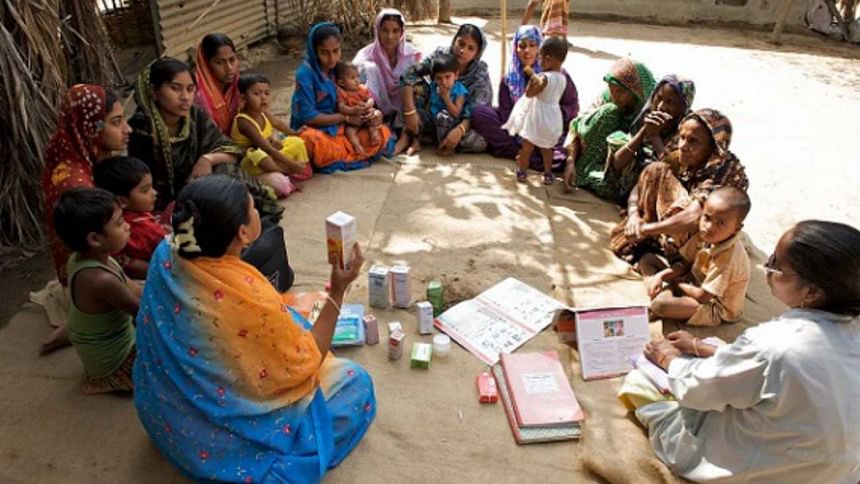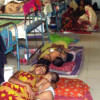Health security should be our first priority

In 1988, being extremely poor and thanks to the poor state of the health sector in the country, my mother died due to maternal health related complication. Till date, I am pained by this loss every waking moment of the day. However, my mother's story is not a unique one. Over the years, thousands of women have died in Bangladesh due to maternal health related causes because of a lack of medical facilities. In fact according to a report published in The Daily Star on May 17, 2012, around "20 mothers die each day" in the country while giving birth.
Estimates based on these figures suggest that each year, 7,300 mothers die while giving birth, which translates into roughly 3,06,600 maternal deaths from 1971-2013. Actual figures are probably higher because maternal mortality rates were higher in the early years but often went unreported.
With regard to child death rate, according to a report published by Save the Children titled "Ending New born Deaths" (2014), 90,000 babies die during childbirth or within 24 hours of their birth every year in Bangladesh due to the absence of trained midwives. Moreover, as an editorial published in daily on April 16, 2017, suggests diarrhoea kills 45,000 children annually in Bangladesh. It is also worth noting that another editorial published in this daily (March 8, 2017) contends pollution, and its many manifestations, is responsible for the death of around 280,000 children in Bangladesh annually, which could be avoided or the number drastically reduced if we had only chosen to act decisively at the right time. This picture, in fact, shows us the poor state of health security in the country which merits serious attention.
The state of the health of Bangladesh merits serious attention because it can change everything, including the country's prosperity, security and development as well as Vision 2021. However, we need to note that while the standard per capita health expenditure for a country specified by World Health Organization is USD 34, Bangladesh spends only USD 5 in this regard.
Health security has long remained a neglected area in Bangladesh compared to military or state security, both in policy as well as in theory, though the referent object of security in Bangladesh needs to be the individuals rather than state. This is most evident by the shortage of medical staff in hospital as evidenced in a report published in Dhaka Tribune (November 21, 2013) which states, "the poorly-equipped public health sector which, although free to the poor, faces an estimated shortage of 800,000 doctors and nurses". This is clearly linked to the negligence of health sector in the country.
Health security is not all about the 'absence of disease'. One also needs to include the psychological dimension of health which also matters. In this context, World Health Organization reveals that about 64 lakh people suffer from depressive disorder while 69 lakh people of the country suffer from anxiety disorders (The Daily Star, February 27, 2017). This results in suicide and other unexpected cases. According to the Bangladesh Health and Injury Survey (BHIS) 2016, sixty-six people commit suicide every day in the country. Of them, 40 are adults and the rest are young adults. This needs to be seen as an issue of grave concern for the country. Although there have been improvements in the health sector in Bangladesh - particularly in life expectancy which is now 70 (WHO 2013), nearly double compared to those born 50-60 years ago (Bhuiya 2012) - the above statistics certainly presents a sorry picture of health security in the country.
Another thing that poses a challenge to the access to healthcare by poor people in Bangladesh is the spiralling costs of common over-the-counter medicines, which are often not regulated or monitored. Moreover, many government-employed doctors in the country are involved with private clinics and thus, are not able to offer proper care to the patients they serve in public hospitals or clinics, thereby leading to negligence and malpractice. The recent death of a Dhaka University student due to wrong treatment by her doctors is an example of this negligence and nonchalance of doctors and hospitals.
Another major concern is that "the government and opposition parties seem to be busy involving doctors of the country in various political activities" (Kabir 2013). When these doctors are involved in politics, they seek to gain personal profits by exploiting their political power. Thus they establish private clinics or pathology labs, which ultimately negatively impacts the health security of the overwhelming poor population in the country. In addition, such unscrupulous doctors also seek frequent transfer from rural to urban areas, thereby hampering the already deteriorating state of the health sector in the rural areas, and resulting in further healthcare inequalities in the country.
Bangladesh also needs to be prepared against epidemic challenges arising in other countries as diseases do not respect international borders. As argued by Ranu S. Dhillon, Devabhaktuni Srikrishna and David Beierwrite in the Harvard Business Review, "China is currently battling a bird flu that kills nearly half of the people infected. If Ebola, which transmits through fluids, were spread by air, or if Zika, which has reached over 50 countries, were as deadly as Ebola, we would be facing an unprecedented catastrophe. An uncontrolled outbreak or bioterror attack could result in a contagion that kills over 30 million people." (March 15, 2017).
In fact, State Minister for Health Zahid Malik had claimed that the Zika virus was found in Bangladesh in 2014. And the most concerning issue for Bangladesh is the recurrence of the Bird Flu virus in the country after three years. According to media reports, a recent outbreak of the particular strain of avian influenza resulted in the deaths of 3,000 birds at a poultry farm in Dhamrai, Dhaka. In addition, 40 countries have reported the new outbreak, according to WHO, a grave concern not only for the country but for the world. Chikungunya is another alarming outbreak in the country that could have been prevented with prior initiatives by the government and state actors.
It is quite encouraging that Bangladesh is embarking on the largest health sector programme ever taken in the country worth BDT 1,15,486 crore to be spent over the next five years, with special emphasis on non-communicable diseases (NCDs) and health governance (The Daily Star, March 22, 2017). It is in fact, 126 percent higher than the earlier (third) programme, which amounted to BDT 51,082 crore, implemented in the period of 2011-2016. Notably, NCDs accounted for 59 percent of total deaths in Bangladesh according to the World Health Organization's NCD country profile in 2014 (cited in The Daily Star, March 22, 2017).
Health security matters for Bangladesh since health insecurity is a major impediment to human potential as it prevents an individual's ability to grow, develop and learn. Alongside the government, all of us, especially the privileged class, business organisations, NGOs and other authorities concerned, need to come forward to ensure the good state of our health sector. And above all, health security governance, and regional and international cooperation is imperative to address health challenges that will arise in the days to come.
The writer is Assistant Professor in International Relations, University of Rajshahi.
E-mail: [email protected]

 For all latest news, follow The Daily Star's Google News channel.
For all latest news, follow The Daily Star's Google News channel. 




Comments